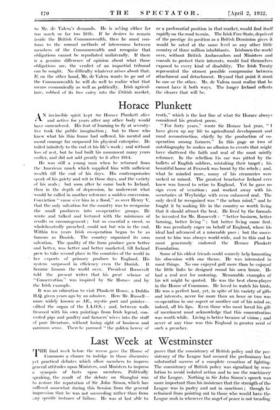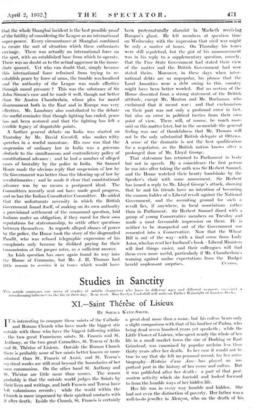Last Week at Westminster
THE linal week before the recess gave the House of
Commons a chance to indulge in those discursive yet practical debates which allow MellIberS to impress general at t dudes upon Ministers, and Ministers to impress a synopsis of facts upon members. Politically speaking, the result of the debate on Shanghai was to restore the reputation of Sir John Shnon, which has suffered somewhat during this Session, from the general impression that he was not succeeding. rather than from i-,ny specific instance of failure: He was at last able to
prove that the consistency of British policy and the per- sistency of the League had secured the preliminary but substantial success of a complete cessation of fighting. The consistency of British policy was signalized by reso- lution to avoid isolated action and to use the machinery of the League. Nothing in Sir John Simon's speech was more important than his insistence that the strength of the League was in parley -and not in sanctions ; though lie refrained from pointing out to those: who would have the League rush in wherever the angel of peace is not treading
that the whole Shanghai incident is the best possible proof of the futility of considering the League as an international super-power: Every circumstance at Shanghai combined to create the sort of situation whiCh these enthusiasts envisage. There was actually an international force on the spot, with an established base from which to operate. TIMie was no doubt as to the actual aggressor in the immc; diate 4itarrel. Yet who can doubt that, simply because this 'international force refrained from trying to re- establiili"periee by force of arms, the trouble was localised :oaf the authority of the League was made effective !trough moral pressure ? This was the substance of Sir John Simon's case and he made it well, though not better than Sir Austen Chamberlain, whose plea for moral disarmament both in the East and in Europe was very effective. Mr. Lansbury also contributed to the debate Ike useful reminder that though-fighting has ended, peace. has not been restored and that the fighting has left a terrible legacy of disputable points.
A further general debate on India was started on Thursday by Mr. David Grenfell, who makes witty speeches in a woeful monotone. His case was that the suspension of ordinary law in India was a grievous obstitele to the simultaneous and contradictory policy of constitutional advance ; and he had a number of alleged eases of brutality by the police in India. Sir Samuel Hoare made the obvious reply that suspension of law by the Government was better than the blowing up of law by revolutionaries ; and he made it clear that constitutional advance was by no means a postponed ideal. The Committees recently sent out have made good progress, and so haS the Indian Consultative Committee. He added that the unfortunate necessity in which the British Government found itself, of making on its own authority a provisional settlement of the communal question, laid Indians under an obligation, if they cared for their own reputations for statesmanship, to settle other questions between themselves. As regards alleged abuses of power by the police, the House took the story of the disgruntled Pandit, who was refused telegraphic expression of his complaints only because he disliked paying for their ransmission at the proper rates, as a sufficient answer: An Irish question has once again found its way into the House of Commons, but Mr. J. H. Thomas had little reason to receive it in tones which would have
been preternaturally alarmist in Macbeth -receiving Banquo's ghost. He left members at question time on Wednesday with the impression that civil war might be only a matter of hours. On Thursday his tones were still sepulchral, but the gist of his announcement was in his reply to a supplementary question, namely. that the Free State Government had stated their view of the matter and the British Government. had now stated theirs. Moreover, in these days when inter- national debts are so unpopular, his phrase that the Land Annuities were a debt owing to this country might have been better worded. But no section of the House dissented from a strong statement of the British attitude, except Mr. Maxton and Mr. Buchanan, who exclaimed that it meant war ; and that exclamation on their part was- not only is profound error in fact, but also an error in political tactics from their own point of view. There will, of course, lie much mow said on this -matter later, but in the meanwhile the general feeling was one of thankfulness that Mr. Thomas will not be the only substantial British delegate at Ottawa. A sense of the dramatic is not the best qualification for a negotiator, as the British nation knows after a prolonged dose of Mr. Lloyd George.
That statesman has returned to Parliament in body but not in speech. By a coincidence the first person he ran into after taking the oath was Sir Herbert Samuel, and the House watched their hearty handshake by the Speaker's chair with some amusement. Sir Herbert has issued a reply to Mr. Lloyd George's attack, showing that he and his friends have no intention of hemming the cannon fodder of a Liberal revolt against the Nat ional Government, and the recruiting ground for such a revolt lies, if anywhere, its local associations rather than in Parliament. Sir Herbert Samuel dined with it group of young Conservative members on Tuesday and made a most favourable impression on them. He is neither to be stampeded out of the Government nor cemented into a Conservative. Now that the Wheat Bill is out of the way—with a final curse from Lady Astor, who has read her husband's book—Liberal Ministers will find things easier, and their colleagues will find them even more useful, particularly it' uIr. Chamberlain's warning against undue expectations from the Budget
herald unpleasant surprises. sr.,

































 Previous page
Previous page